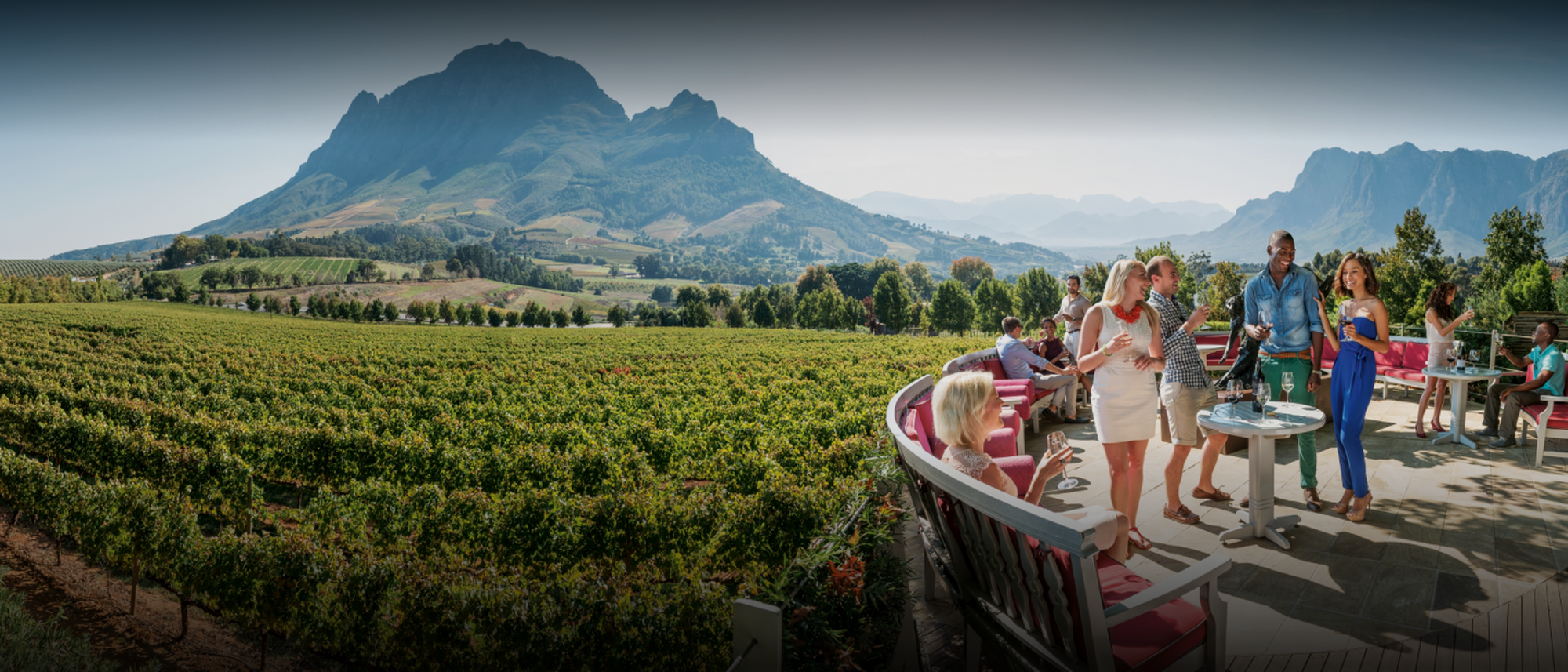Constantia
The majestic Constantia Valley is the cradle of winemaking in the Cape and the oldest, uninterrupted wine-growing region in the southern hemisphere. Governor Simon Van der Stel founded Constantia’s first wine farm, Groot Constantia, in 1685. The old homestead is one of the finest examples of Cape Dutch architecture and is today a museum furnished with exquisite antiques.
Constantia’s many vineyards hug the east-facing slopes of Constantiaberg, where the vines benefit from cool sea breezes off False Bay. The estates along this historic route include Groot Constantia, Klein Constantia, Buitenverwachting, Constantia Uitsig, Steenberg, Constantia Glen, Eagles’ Nest, Constantia Royale, Silvermist and Beau Constantia.
Apart from sampling the estates’ various award-winning wines, take a stroll through the vineyards and leafy greenbelts, visit quaint cafes and country stores, enjoy picnics and bubbly on winery lawns and stay over in any number of excellent boutique hotels. The valley also boasts world-class restaurants, including La Colombe, Jonkershuis Constantia, Tryn at Steenberg, Greenhouse at Cellars Hohenort and Buitenverwachting Restaurant.
Hout Bay
Set high on the eastern slopes of Hout Bay lies a small, family-owned vineyard offering a range of wines including a well-respected Cap Classique sparkling wine, a Sauvignon Blanc, a light ‘blush’ rosé, a variety of reds and a very decent port.
In 2001, Cathy and Peter Roeloffze began excavations for their dream home at the top of Grotto Way in Hout Bay, and their first grapes were harvested in January 2008. Hout Bay Vineyards has also formed alliances with other wineries in the valley to share grapes and produce their wide range of offerings.
The wines are primarily available on open days, but Peter and Cathy also accommodate those who’ve run low on stock at other times and welcome visits. Tastings and sales are by appointment only. Other products from the estate include honey and cold-pressed olive oil.
Cape Point Vineyards
Cape Point Vineyards is a family-owned estate set on the slopes of Chapman’s Peak overlooking the Atlantic. The panoromic views of mountains, fynbos hills and sweep of Noordhoek Beach are simply spectacular.
Cool sea breezes and ancient mountain soils make for a unique terroir and a late growing season that results in a fine Sauvignon Blanc known for its rich minerality, structure and tone
Visit Cape Point Vineyards for wine tasting or to enjoy a meal in the estate’s restaurant with its Mediterranean style menu and wine pairings. Many visitors prefer to order a picnic hamper (blanket and pillows provided) and sit out on the lawns to enjoy the views. There’s also a popular weekly pop-up market – something of an institution on the South Peninsula – in an idyllic lakeside setting (currently on pause during Covid-19).
Web: http://cpv.co.za/
Durbanville
While each wine farm in Durbanville has reason to be proud of its produce, lovers of a good Shiraz, Pinotage or Bordeaux blend should stop in at Diemersdal, Meerendal and De Grendel. For refreshingly good Sauvignon Blanc make sure you try the Durbanville Hills and the Bloemendal ranges.
Each farm has its own charm and unique tasting room, however, Klein Roosboom’s wine-tasting ‘caves’ must be the most unusual. For beautiful views from high on a hill, wine tasting at De Grendel, Durbanville Hills, Hillcrest, Ntida and Signal Gun is recommended.
D’Aria offers a beautiful shaded outdoor tasting area (and in addition to wine, has a gin distillery) while Diemersdal and Altydgedacht give you the impression of being tucked away in the farmland, far away from the everyday hustle and bustle.
Canto is the newest boutique winery in Durbanville and presents a macaron and MCC tasting in its recently-built, trendy barn.
The lunch at Groot Phesantekraal Restaurant – set in the farm’s stable which was built in 1767 and retains its wooden feeding troughs – is a treat. The setting isn’t typical of a wine farm, as grape growing is a relatively recent agricultural addition. Historically, cattle, sheep and grain have been farmed here in the time since Governor Simon van der Stel gave the land to the first owner, Olof Bergh, in 1698 and the farm has retained a pastoral atmosphere.

















